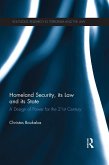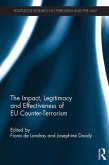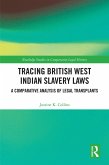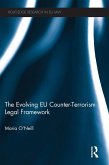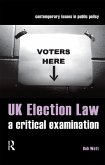Homeland Security in the UK (eBook, PDF)
Future Preparedness for Terrorist Attack since 9/11
Redaktion: Wilkinson, Paul
30,95 €
30,95 €
inkl. MwSt.
Sofort per Download lieferbar

15 °P sammeln
30,95 €
Als Download kaufen

30,95 €
inkl. MwSt.
Sofort per Download lieferbar

15 °P sammeln
Jetzt verschenken
Alle Infos zum eBook verschenken
30,95 €
inkl. MwSt.
Sofort per Download lieferbar
Alle Infos zum eBook verschenken

15 °P sammeln
Homeland Security in the UK (eBook, PDF)
Future Preparedness for Terrorist Attack since 9/11
Redaktion: Wilkinson, Paul
- Format: PDF
- Merkliste
- Auf die Merkliste
- Bewerten Bewerten
- Teilen
- Produkt teilen
- Produkterinnerung
- Produkterinnerung

Bitte loggen Sie sich zunächst in Ihr Kundenkonto ein oder registrieren Sie sich bei
bücher.de, um das eBook-Abo tolino select nutzen zu können.
Hier können Sie sich einloggen
Hier können Sie sich einloggen
Sie sind bereits eingeloggt. Klicken Sie auf 2. tolino select Abo, um fortzufahren.

Bitte loggen Sie sich zunächst in Ihr Kundenkonto ein oder registrieren Sie sich bei bücher.de, um das eBook-Abo tolino select nutzen zu können.
This book is a detailed examination of whether domestic security measures are striking an appropriate balance between homeland security and civil liberties in the post-9/11 era.
- Geräte: PC
- mit Kopierschutz
- eBook Hilfe
- Größe: 3.35MB
Andere Kunden interessierten sich auch für
![Homeland Security in the UK (eBook, ePUB) Homeland Security in the UK (eBook, ePUB)]() Homeland Security in the UK (eBook, ePUB)30,95 €
Homeland Security in the UK (eBook, ePUB)30,95 €![Homeland Security, its Law and its State (eBook, PDF) Homeland Security, its Law and its State (eBook, PDF)]() Christos BoukalasHomeland Security, its Law and its State (eBook, PDF)46,95 €
Christos BoukalasHomeland Security, its Law and its State (eBook, PDF)46,95 €![The Impact, Legitimacy and Effectiveness of EU Counter-Terrorism (eBook, PDF) The Impact, Legitimacy and Effectiveness of EU Counter-Terrorism (eBook, PDF)]() The Impact, Legitimacy and Effectiveness of EU Counter-Terrorism (eBook, PDF)52,95 €
The Impact, Legitimacy and Effectiveness of EU Counter-Terrorism (eBook, PDF)52,95 €![Tracing British West Indian Slavery Laws (eBook, PDF) Tracing British West Indian Slavery Laws (eBook, PDF)]() Justine K. CollinsTracing British West Indian Slavery Laws (eBook, PDF)42,95 €
Justine K. CollinsTracing British West Indian Slavery Laws (eBook, PDF)42,95 €![The Evolving EU Counter-terrorism Legal Framework (eBook, PDF) The Evolving EU Counter-terrorism Legal Framework (eBook, PDF)]() Maria O'NeillThe Evolving EU Counter-terrorism Legal Framework (eBook, PDF)43,95 €
Maria O'NeillThe Evolving EU Counter-terrorism Legal Framework (eBook, PDF)43,95 €![UK Election Law (eBook, PDF) UK Election Law (eBook, PDF)]() Bob WattUK Election Law (eBook, PDF)61,95 €
Bob WattUK Election Law (eBook, PDF)61,95 €![Ownership, Narrative, Things (eBook, PDF) Ownership, Narrative, Things (eBook, PDF)]() Dave CowanOwnership, Narrative, Things (eBook, PDF)65,95 €
Dave CowanOwnership, Narrative, Things (eBook, PDF)65,95 €-
-
-
This book is a detailed examination of whether domestic security measures are striking an appropriate balance between homeland security and civil liberties in the post-9/11 era.
Hinweis: Dieser Artikel kann nur an eine deutsche Lieferadresse ausgeliefert werden.
Dieser Download kann aus rechtlichen Gründen nur mit Rechnungsadresse in A, B, BG, CY, CZ, D, DK, EW, E, FIN, F, GR, HR, H, IRL, I, LT, L, LR, M, NL, PL, P, R, S, SLO, SK ausgeliefert werden.
Hinweis: Dieser Artikel kann nur an eine deutsche Lieferadresse ausgeliefert werden.
Produktdetails
- Produktdetails
- Verlag: Taylor & Francis eBooks
- Seitenzahl: 432
- Erscheinungstermin: 18. Juni 2007
- Englisch
- ISBN-13: 9781134176090
- Artikelnr.: 42739475
- Verlag: Taylor & Francis eBooks
- Seitenzahl: 432
- Erscheinungstermin: 18. Juni 2007
- Englisch
- ISBN-13: 9781134176090
- Artikelnr.: 42739475
- Herstellerkennzeichnung Die Herstellerinformationen sind derzeit nicht verfügbar.
Paul Wilkinson
Part 1: Introduction 1. Introduction Paul Wilkinson Part 2: Threat
Assessment 2. The Threat from the Al-Qaeda Network Paul Wilkinson 3.
International Terrorism and the UK: Assessing the Threat Tamara Makarenko
4. The Chemical, Biological, Radiological and Nuclear Weapons Threat Jez
Littlewood and John Simpson 5. The Domestic Threat: The Cases of Northern
Ireland and Animal Rights Extremism Anthony Richards Part 3: UK Efforts to
Enhance Preparedness since 9/11 6. National Governance Structures to Manage
the Response to Terrorist Threats and Attacks: A Cross-National Comparative
Analysis with Special Reference to the UK 'Lead Department' Response
Structure and UK Counter-Terrorism Strategy Frank Gregory 7. Reducing the
Chemical, Biological, Radiological and Nuclear Weapons Threat: The Role of
Counter-Proliferation, Arms Control and Disarmament John Simpson and Jez
Littlewood 8. The UK and the Threat of Nuclear Terrorism: A Case Study of
Organisational Responses John Simpson 9. An Assessment of the Contribution
of Intelligence-Led Counter-Terrorism to UK Homeland Security Post 9/11
within the 'Contest' Strategy Frank Gregory 10. Police and
Counter-Terrorism in the UK: A Study of 'One of the Highest and Most
Challenging Priorities for Police Forces Nationally' Frank Gregory 11.
Immigration and Asylum Issues Tamara Makarenko 12. Enhancing UK Aviation
Security Post 9/11 Paul Wilkinson 13. Port Security in the UK: The Spectre
of Maritime Terrorism Peter Lehr 14. Terrorism and Public Information
Anthony Richards 15. Cyber-Security and the Critical National
Infrastructure Darryl Howlett 16. Private Sector Roles in Counter-Terrorism
Frank Gregory Part 4: Civil Contingencies and Emergency Response 17. UK
Draft Civil Contingencies Bill 2003 and its Subsequent Act: Building Block
for Homeland Security? Frank Gregory 18. The Emergency Response: Progress
and Problems Anthony Richards Part 5: International Dimensions and Main
Conclusions of Authors 19. International Dimensions of Homeland Security
Paul Wilkinson 20. Main Conclusions of the Authors Project Team
Assessment 2. The Threat from the Al-Qaeda Network Paul Wilkinson 3.
International Terrorism and the UK: Assessing the Threat Tamara Makarenko
4. The Chemical, Biological, Radiological and Nuclear Weapons Threat Jez
Littlewood and John Simpson 5. The Domestic Threat: The Cases of Northern
Ireland and Animal Rights Extremism Anthony Richards Part 3: UK Efforts to
Enhance Preparedness since 9/11 6. National Governance Structures to Manage
the Response to Terrorist Threats and Attacks: A Cross-National Comparative
Analysis with Special Reference to the UK 'Lead Department' Response
Structure and UK Counter-Terrorism Strategy Frank Gregory 7. Reducing the
Chemical, Biological, Radiological and Nuclear Weapons Threat: The Role of
Counter-Proliferation, Arms Control and Disarmament John Simpson and Jez
Littlewood 8. The UK and the Threat of Nuclear Terrorism: A Case Study of
Organisational Responses John Simpson 9. An Assessment of the Contribution
of Intelligence-Led Counter-Terrorism to UK Homeland Security Post 9/11
within the 'Contest' Strategy Frank Gregory 10. Police and
Counter-Terrorism in the UK: A Study of 'One of the Highest and Most
Challenging Priorities for Police Forces Nationally' Frank Gregory 11.
Immigration and Asylum Issues Tamara Makarenko 12. Enhancing UK Aviation
Security Post 9/11 Paul Wilkinson 13. Port Security in the UK: The Spectre
of Maritime Terrorism Peter Lehr 14. Terrorism and Public Information
Anthony Richards 15. Cyber-Security and the Critical National
Infrastructure Darryl Howlett 16. Private Sector Roles in Counter-Terrorism
Frank Gregory Part 4: Civil Contingencies and Emergency Response 17. UK
Draft Civil Contingencies Bill 2003 and its Subsequent Act: Building Block
for Homeland Security? Frank Gregory 18. The Emergency Response: Progress
and Problems Anthony Richards Part 5: International Dimensions and Main
Conclusions of Authors 19. International Dimensions of Homeland Security
Paul Wilkinson 20. Main Conclusions of the Authors Project Team
Part 1: Introduction 1. Introduction Paul Wilkinson Part 2: Threat
Assessment 2. The Threat from the Al-Qaeda Network Paul Wilkinson 3.
International Terrorism and the UK: Assessing the Threat Tamara Makarenko
4. The Chemical, Biological, Radiological and Nuclear Weapons Threat Jez
Littlewood and John Simpson 5. The Domestic Threat: The Cases of Northern
Ireland and Animal Rights Extremism Anthony Richards Part 3: UK Efforts to
Enhance Preparedness since 9/11 6. National Governance Structures to Manage
the Response to Terrorist Threats and Attacks: A Cross-National Comparative
Analysis with Special Reference to the UK 'Lead Department' Response
Structure and UK Counter-Terrorism Strategy Frank Gregory 7. Reducing the
Chemical, Biological, Radiological and Nuclear Weapons Threat: The Role of
Counter-Proliferation, Arms Control and Disarmament John Simpson and Jez
Littlewood 8. The UK and the Threat of Nuclear Terrorism: A Case Study of
Organisational Responses John Simpson 9. An Assessment of the Contribution
of Intelligence-Led Counter-Terrorism to UK Homeland Security Post 9/11
within the 'Contest' Strategy Frank Gregory 10. Police and
Counter-Terrorism in the UK: A Study of 'One of the Highest and Most
Challenging Priorities for Police Forces Nationally' Frank Gregory 11.
Immigration and Asylum Issues Tamara Makarenko 12. Enhancing UK Aviation
Security Post 9/11 Paul Wilkinson 13. Port Security in the UK: The Spectre
of Maritime Terrorism Peter Lehr 14. Terrorism and Public Information
Anthony Richards 15. Cyber-Security and the Critical National
Infrastructure Darryl Howlett 16. Private Sector Roles in Counter-Terrorism
Frank Gregory Part 4: Civil Contingencies and Emergency Response 17. UK
Draft Civil Contingencies Bill 2003 and its Subsequent Act: Building Block
for Homeland Security? Frank Gregory 18. The Emergency Response: Progress
and Problems Anthony Richards Part 5: International Dimensions and Main
Conclusions of Authors 19. International Dimensions of Homeland Security
Paul Wilkinson 20. Main Conclusions of the Authors Project Team
Assessment 2. The Threat from the Al-Qaeda Network Paul Wilkinson 3.
International Terrorism and the UK: Assessing the Threat Tamara Makarenko
4. The Chemical, Biological, Radiological and Nuclear Weapons Threat Jez
Littlewood and John Simpson 5. The Domestic Threat: The Cases of Northern
Ireland and Animal Rights Extremism Anthony Richards Part 3: UK Efforts to
Enhance Preparedness since 9/11 6. National Governance Structures to Manage
the Response to Terrorist Threats and Attacks: A Cross-National Comparative
Analysis with Special Reference to the UK 'Lead Department' Response
Structure and UK Counter-Terrorism Strategy Frank Gregory 7. Reducing the
Chemical, Biological, Radiological and Nuclear Weapons Threat: The Role of
Counter-Proliferation, Arms Control and Disarmament John Simpson and Jez
Littlewood 8. The UK and the Threat of Nuclear Terrorism: A Case Study of
Organisational Responses John Simpson 9. An Assessment of the Contribution
of Intelligence-Led Counter-Terrorism to UK Homeland Security Post 9/11
within the 'Contest' Strategy Frank Gregory 10. Police and
Counter-Terrorism in the UK: A Study of 'One of the Highest and Most
Challenging Priorities for Police Forces Nationally' Frank Gregory 11.
Immigration and Asylum Issues Tamara Makarenko 12. Enhancing UK Aviation
Security Post 9/11 Paul Wilkinson 13. Port Security in the UK: The Spectre
of Maritime Terrorism Peter Lehr 14. Terrorism and Public Information
Anthony Richards 15. Cyber-Security and the Critical National
Infrastructure Darryl Howlett 16. Private Sector Roles in Counter-Terrorism
Frank Gregory Part 4: Civil Contingencies and Emergency Response 17. UK
Draft Civil Contingencies Bill 2003 and its Subsequent Act: Building Block
for Homeland Security? Frank Gregory 18. The Emergency Response: Progress
and Problems Anthony Richards Part 5: International Dimensions and Main
Conclusions of Authors 19. International Dimensions of Homeland Security
Paul Wilkinson 20. Main Conclusions of the Authors Project Team


